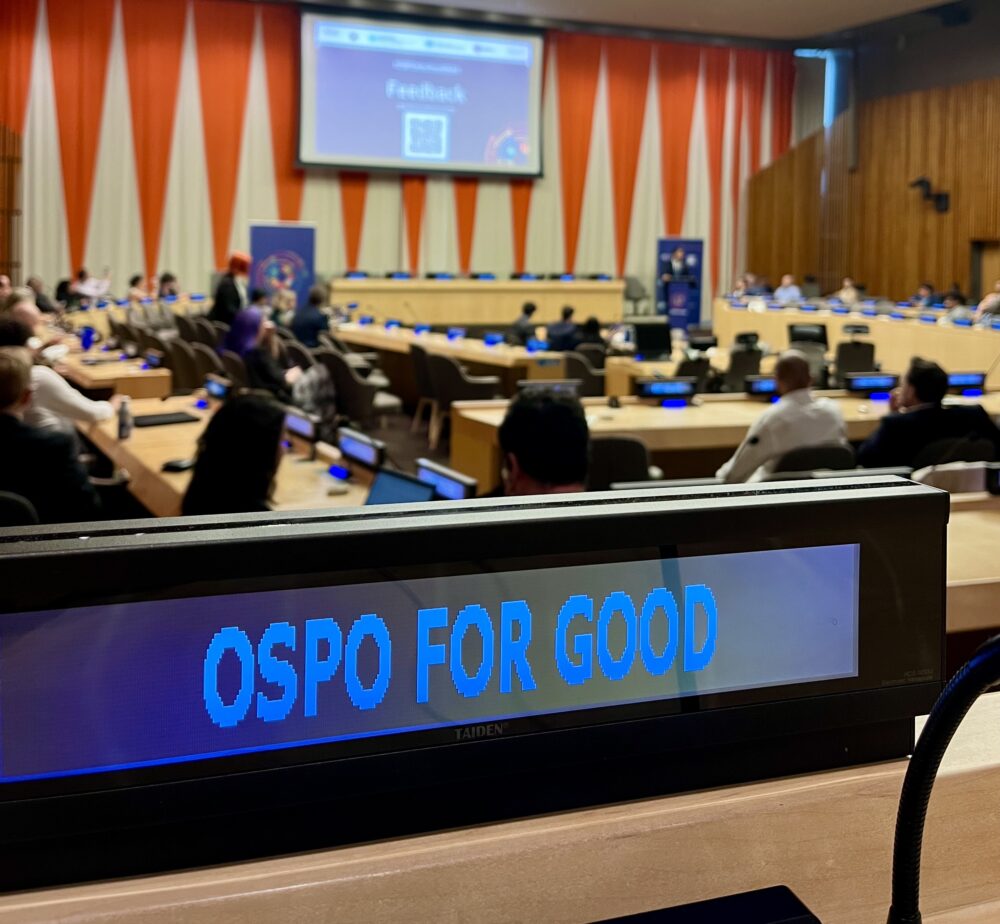
Looking Beyond Governance at the United Nations’ OSPOs for Good Conference
By Powen Shiah
Germany was a host country of the 2nd UN summit on open source in early July 2024. Adriana Groh & Fiona Krakenbürger presented how STF strengthens the FOSS ecosystem and how, with ZenDiS, we’re pioneering a holistic approach for the role governments can play.
The United Nations OSPOs for Good conference took place the first week of July 2024 in New York, USA at the UN headquarters. It’s the second time the United Nations Envoy on Technology and the Office of Information and Communications Technology have organized this event, bringing together representatives from public and private sectors, as well as non-governmental and civil society organizations to discuss open source policy, how Open Source Program Offices (OSPOs) and other actors can coordinate and cooperate open source activities around the globe.
To convene the many speakers, participants, and other guests before the official start of the conference, we hosted a welcome reception together with ZenDiS (Center of Digital Sovereignty in the Public Administration), with the support of the German Federal Ministry of the Interior and Community and the German Federal Foreign Office. State Secretary and federal government CIO Dr. Markus Richter, Foreign Office Minister of State Tobias Lindner, ZenDiS CEO Andreas Reckert-Lodde as well as STF co-founders Adriana Groh and Fiona Krakenbürger opened the informal event.
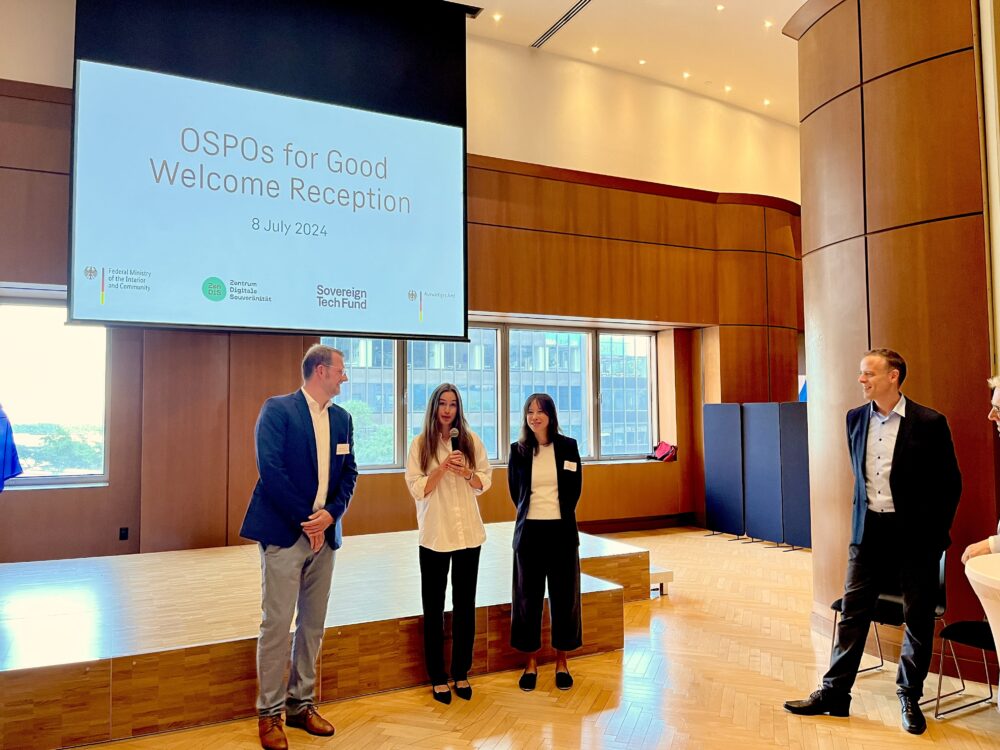
Andreas Reckert-Lodde, Adriana Groh, Fiona Krakenbürger, and Dr. Markus Richter making welcoming remarks at the reception.
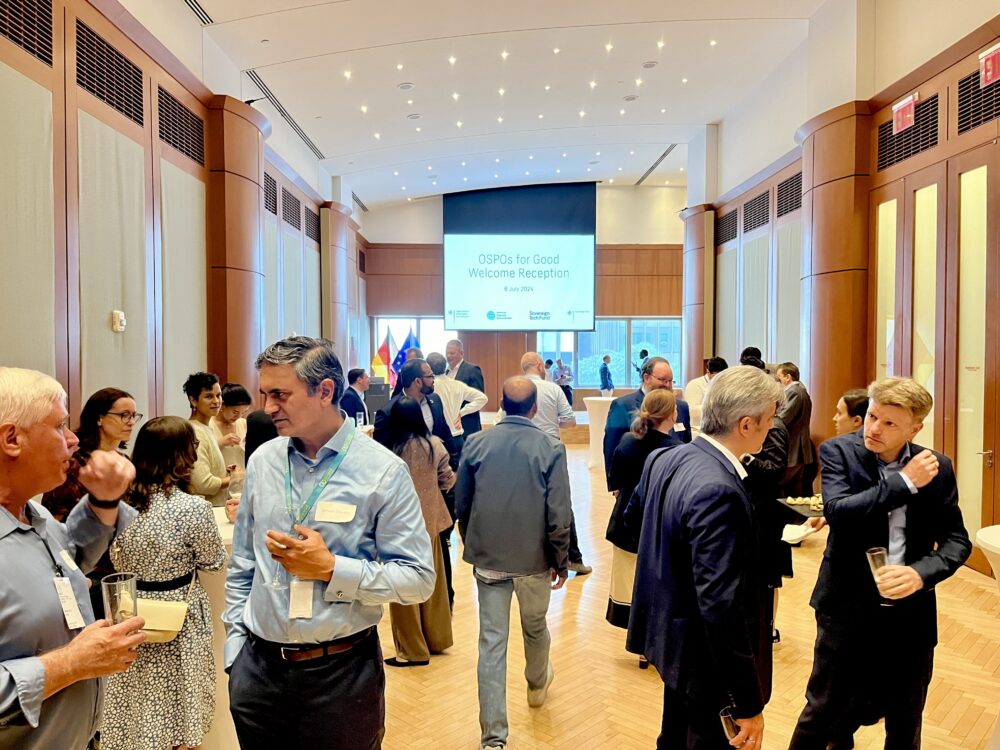
A room full of guests having conversations in small groups at the reception hosted by STF, ZenDiS, BMI, and AA.
Keynote: What’s the Government’s Role in Making Open Source Work?
Kicking off the second day of the conference, STF’s Adriana Groh and ZenDiS’ Andreas Reckert-Lodde gave the keynote address for the segment “Open Source at Work in the World,” asking “What’s the Government’s Role in Making Open Source Work?”
Watch the keynote address on UN Web TV
They began by explaining the two new public sector organizations:
“[ZenDiS is] a competency and service center that strengthens the digital sovereignty of the federal, state, and local German governments.
Our first task is to implement more open source into the German government. Therefore, we are the OSPO for the German public administration… We bundle requirements from the public sector and collaborate with open source ecosystems, open source partners, some of them are already here. We do not only do governance, we do more. We set up projects to enable the use of open source in Germany.”
— Andreas Reckert-Lodde, director, ZenDiS
“[The Sovereign Tech Fund’s] core mission is to support the open source ecosystem, and we do that with a focus on digital infrastructure… That gives us a really laser focus on the people in the open source ecosystem and the maintenance of existing code. We really understand that the open source ecosystem is the foundation for many things we want to achieve: be it innovation, competition, but also transparency, participation, and democracy.
Andreas explained ZenDiS as the OSPO of the German government, I explain the Sovereign Tech Fund as the engine room that runs underneath it, to make sure that approach is aligned and what we’re doing supports ZenDiS mission. The impact in the end is really visible for government, civil society, and also companies.”
— Adriana Groh, co-founder, Sovereign Tech Fund
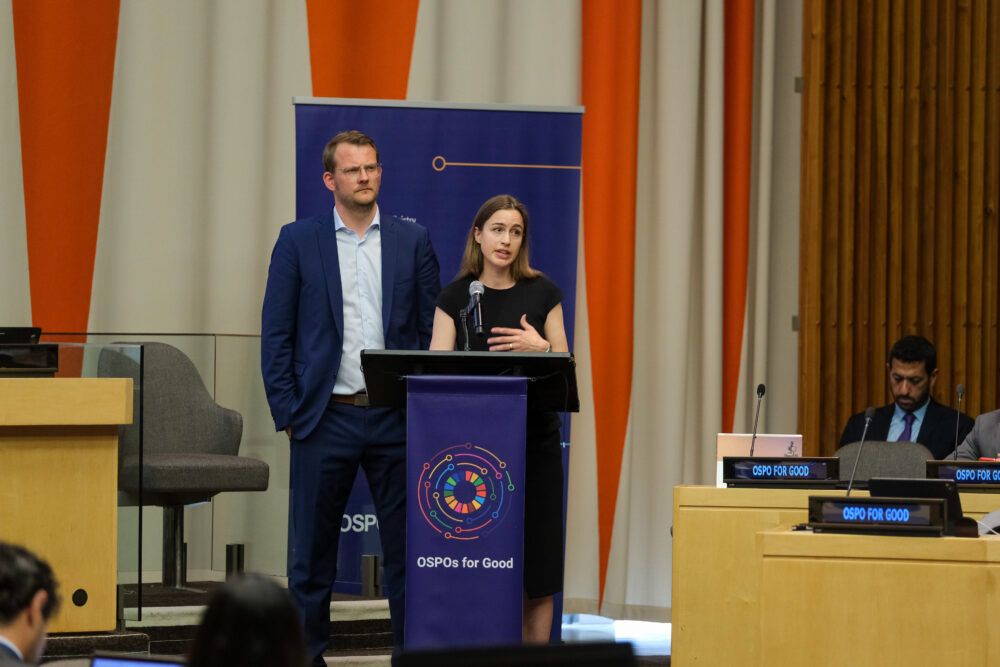
Andreas Reckert-Lodde (left) and Adriana Groh (right) giving the keynote at the OSPOs for Good conference in the UN Economic and Social Council Chamber.
Adriana concluded by calling for governments to take a more active and collaborative role:
“It’s pretty clear that we benefit massively from the open source ecosystem. As governments, we cannot outsource maintaining this ecosystem to volunteer communities and the private sector. We need government in this mix as well. Everyone needs to talk to each other and make sure that the roles that we pick up are complementary, so that in the end the whole ecosystem gets stronger, and the rising tide lifts all boats.“
Continuing the discussions at “What’s Next for Open Source”
The day following the conference, OSPO++ and the Apache Software and Linux Foundations hosted further workshops at the Microsoft and GitHub offices in New York. It was an opportunity to continue the discussions sparked at OSPOs for Good, go into further details on crucial topics, and cement new contacts.
As part of a series of discussions on “Open Source Infrastructure for Social Good” focusing on the role of governments and open source infrastructure, STF co-founder Adriana Groh spoke on the government-focused panel with Jonathan Lloyd, (Digital Public Goods Alliance), Anir Chowdhury (a2i).
In the segment “Safeguarding Our Public Goods, For Everyone”, STF co-founder Fiona Krakenbürger spoke on the panel “Making Open Source Secure and Sustainable” with Stephen Augustus (Cisco), Dan Appelquist (Samsung), and David Hook (Keyfactor). She shared that the recent xz-utils backdoor incident highlights systemic concerns about the sustainability of open source software maintainers, emphasizing the need for many different kinds of support. Potential solutions go beyond financial investment, which the STF has been working on. Sustainability is also connected to improving code maintainability, reducing technical debt, community growth and guidance, and fostering partnerships that improve developer infrastructure. She pointed out the need to carefully test new approaches like a fellowship program to address long-term project sustainability.
Germany well-represented at OPSOs for Good
As a host country for OSPOs for Good conference, STF and other representatives from the German public sector played a significant role in the program, participating in panels and hosting side events. Beyond the institutions named above, there were also representatives from the Federal Office for Information Security (BSI), the Federal Chancellery, the state government of Schleswig Holstein, and GIZ, the German agency for international development. There were also attendees from German private sector companies, non-profit organizations, and academia.
It’s inspiring to know that there are so many people and institutions that recognize the crucial role open technologies have in our digital lives — not only in Germany, or Europe, but around the world. We look forward to continued collaboration and coordination, the only way we can collectively ensure the resilience and flourishing of this unique technology ecosystem
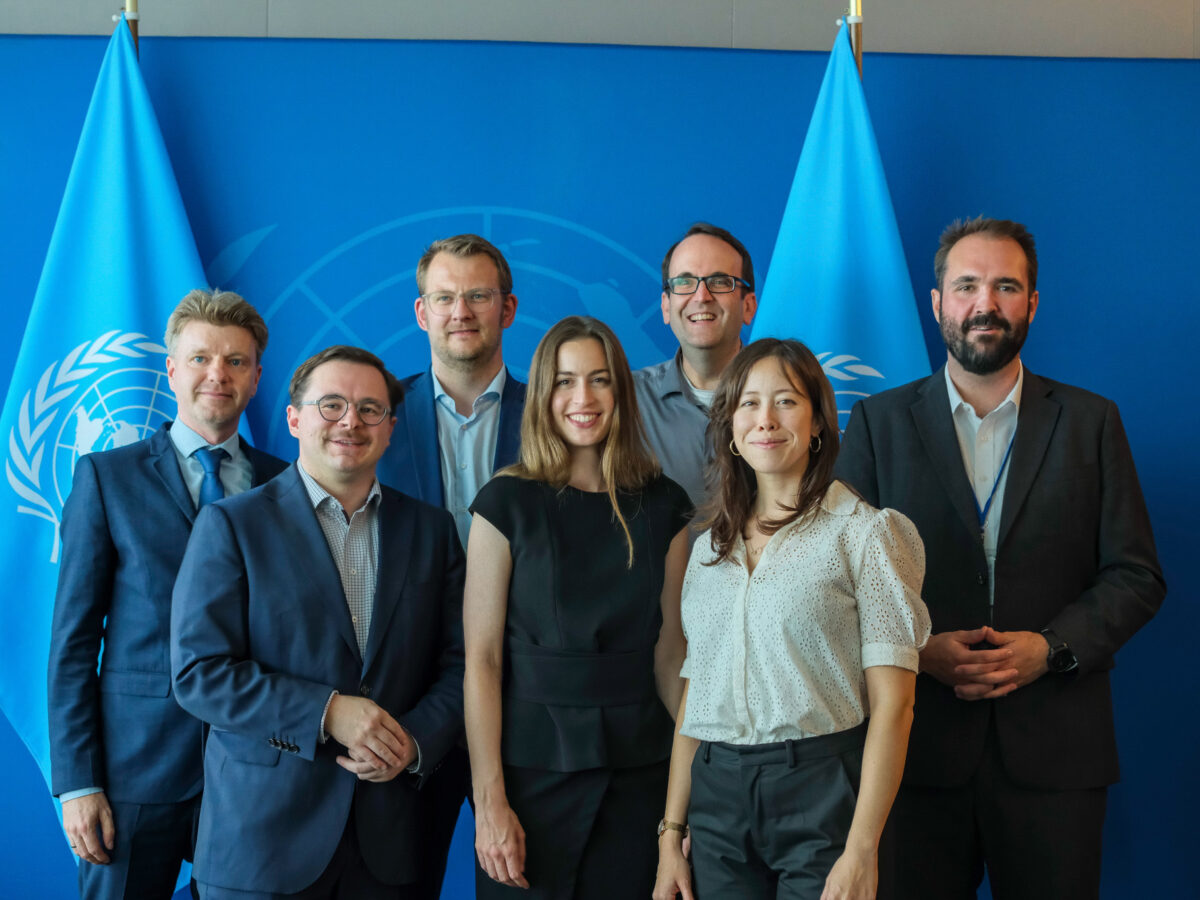
L-R: Nils Masuch (BMI), Alex Smolianitski (ZenDiS), Andreas Reckert-Lodde (ZenDiS), Adriana Groh (STF), Thomas Caspers (BSI), Fiona Krakenbürger (STF), Frederik Blachetta (Chancellery)
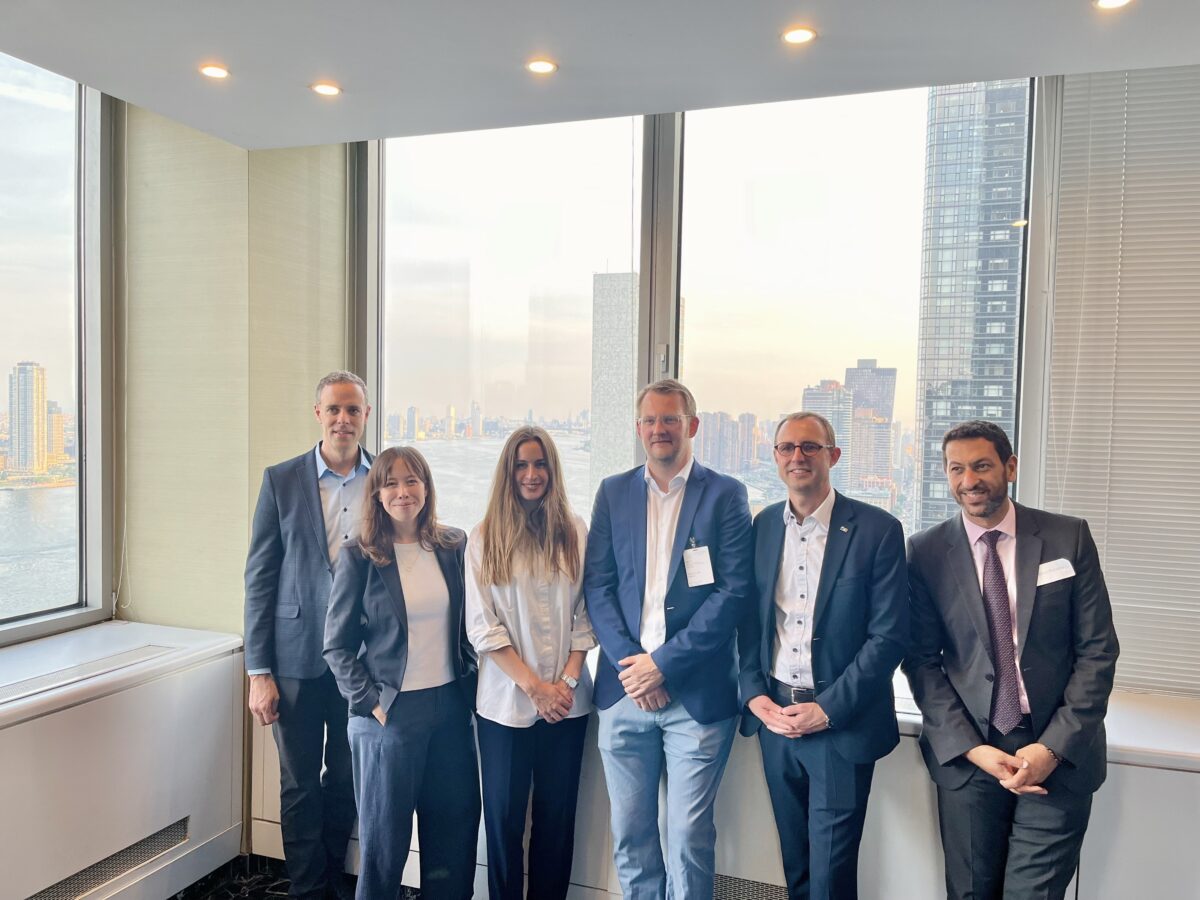
L-R: Dr. Markus Richter (BMI), Fiona Krakenbürger (STF), Adriana Groh (STF), Andreas Reckert-Lodde (ZenDiS), Thomas Caspers (BSI), Dirk Schrödter (State Chancellery of Schleswig-Holstein), Omar Moshine (UN OSET)
An opportunity to meet maintainers, contributors, and partners
It was also an opportunity to see some people in person for the first time with whom we’ve been collaborating:
- Qianqian Ye, who plays a key role in p5.js, part of the Contribute Back Challenges program in 2023 and 2024
- William Woodruff from Trail of Bits, with whom we worked on the Python Package Index.
- Amir Montazery of the Open Source Technology Improvement Fund (OSTIF), one of the Bug Resilience Program implementation partners.
We’re thankful for the United Nations for convening so many passionate and knowledgeable people together for productive and inspiring discussions about open technologies. It was an unique opportunity to share the work that Sovereign Tech Fund is doing on maintaining and securing foundational software infrastructure in front of a global audience. It’s our hope that presenting a model for strategic coordination between German public institutions and sharing how these efforts evolve will provide a roadmap that the global community can improve together — in true open source fashion.


